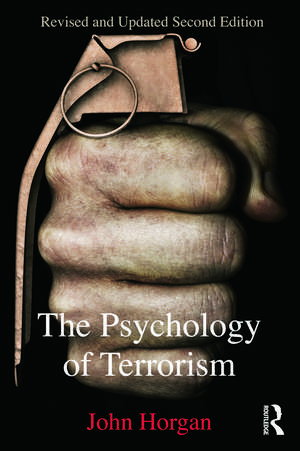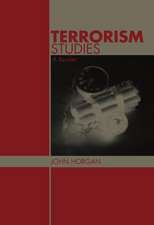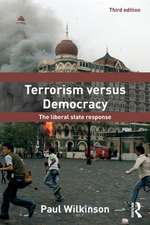The Psychology of Terrorism: Political Violence
Autor John G. Horganen Limba Engleză Paperback – 16 iun 2014
The book presents a critical analysis of our existing knowledge and understanding of terrorist psychology. Despite the on-going search for a terrorist pathology, the most insightful and evidence-based research to date not only illustrates the lack of any identifiable psychopathology in terrorists, but demonstrates how frighteningly 'normal' and unremarkable in psychological terms are those who engage in terrorist activity. By producing a clearer map of the processes that impinge upon the individual terrorist, a different type of terrorist psychology emerges, one which has clearer implications for efforts at countering and disrupting violent extremism in today's world.
In this 2nd edition, Horgan further develops his approach to the arc of terrorism by delving deeper into his IED model of Involvement, Engagement and Disengagement – the three phases of terrorism experienced by every single terrorist. Drawing on new and exciting research from the past decade, with new details from interviews with terrorists ranging from al-Qaeda to left-wing revolutionaries, biographies and autobiographies of former terrorists, and insights from historic and contemporary terrorist attacks since 2005, Horgan presents a fully revised and expanded edition of his signature text.
This new edition of The Psychology of Terrorism will be essential reading for students of terrorism and political violence, and counterterrorism studies, and recommended for forensic psychology, criminology, international security and IR in general.
| Toate formatele și edițiile | Preț | Express |
|---|---|---|
| Paperback (1) | 389.22 lei 6-8 săpt. | |
| Taylor & Francis – 16 iun 2014 | 389.22 lei 6-8 săpt. | |
| Hardback (1) | 1326.23 lei 6-8 săpt. | |
| Taylor & Francis – 16 iun 2014 | 1326.23 lei 6-8 săpt. |
Din seria Political Violence
-
 Preț: 280.17 lei
Preț: 280.17 lei -
 Preț: 325.72 lei
Preț: 325.72 lei -
 Preț: 280.14 lei
Preț: 280.14 lei -
 Preț: 317.26 lei
Preț: 317.26 lei - 18%
 Preț: 1112.21 lei
Preț: 1112.21 lei -
 Preț: 470.07 lei
Preț: 470.07 lei -
 Preț: 391.34 lei
Preț: 391.34 lei - 25%
 Preț: 325.02 lei
Preț: 325.02 lei -
 Preț: 348.11 lei
Preț: 348.11 lei -
 Preț: 410.46 lei
Preț: 410.46 lei - 13%
 Preț: 296.19 lei
Preț: 296.19 lei -
 Preț: 408.00 lei
Preț: 408.00 lei - 18%
 Preț: 1112.90 lei
Preț: 1112.90 lei -
 Preț: 485.46 lei
Preț: 485.46 lei -
 Preț: 393.26 lei
Preț: 393.26 lei -
 Preț: 490.40 lei
Preț: 490.40 lei -
 Preț: 416.52 lei
Preț: 416.52 lei - 18%
 Preț: 1113.12 lei
Preț: 1113.12 lei -
 Preț: 494.07 lei
Preț: 494.07 lei -
 Preț: 435.21 lei
Preț: 435.21 lei - 16%
 Preț: 306.13 lei
Preț: 306.13 lei -
 Preț: 442.83 lei
Preț: 442.83 lei - 18%
 Preț: 1444.61 lei
Preț: 1444.61 lei - 18%
 Preț: 1112.53 lei
Preț: 1112.53 lei -
 Preț: 391.50 lei
Preț: 391.50 lei - 18%
 Preț: 1278.08 lei
Preț: 1278.08 lei -
 Preț: 317.26 lei
Preț: 317.26 lei - 17%
 Preț: 243.29 lei
Preț: 243.29 lei - 18%
 Preț: 1113.16 lei
Preț: 1113.16 lei - 33%
 Preț: 326.14 lei
Preț: 326.14 lei -
 Preț: 447.17 lei
Preț: 447.17 lei -
 Preț: 209.56 lei
Preț: 209.56 lei - 30%
 Preț: 847.31 lei
Preț: 847.31 lei - 18%
 Preț: 1173.97 lei
Preț: 1173.97 lei
Preț: 389.22 lei
Preț vechi: 423.07 lei
-8% Nou
Puncte Express: 584
Preț estimativ în valută:
74.48€ • 79.64$ • 62.10£
74.48€ • 79.64$ • 62.10£
Carte tipărită la comandă
Livrare economică 17 aprilie-01 mai
Preluare comenzi: 021 569.72.76
Specificații
ISBN-13: 9780415698023
ISBN-10: 0415698022
Pagini: 206
Dimensiuni: 156 x 234 x 13 mm
Greutate: 0.32 kg
Ediția:Revizuită
Editura: Taylor & Francis
Colecția Routledge
Seria Political Violence
Locul publicării:Oxford, United Kingdom
ISBN-10: 0415698022
Pagini: 206
Dimensiuni: 156 x 234 x 13 mm
Greutate: 0.32 kg
Ediția:Revizuită
Editura: Taylor & Francis
Colecția Routledge
Seria Political Violence
Locul publicării:Oxford, United Kingdom
Public țintă
Postgraduate, Professional, and UndergraduateCuprins
Preface to 2nd Edition
Introduction
1: Psychological Warfare
2: Understanding Terrorism
3: Terrorist Minds?
4: Involvement
5: Engagement
6: Disengagement
7: Towards a Science of Terrorist Behaviour
Select Bibliography
Introduction
1: Psychological Warfare
2: Understanding Terrorism
3: Terrorist Minds?
4: Involvement
5: Engagement
6: Disengagement
7: Towards a Science of Terrorist Behaviour
Select Bibliography
Notă biografică
John Horgan is Professor of Security Studies and Director of the Center for Terrorism and Security Studies at the University of Massachusetts, Lowell, USA. He is co-editor of The Future of Terrorism (Cass 2000, with Max Taylor) and the Terrorism Studies Reader (Routledge 2011, with Kurt Braddock), and author of The Psychology of Terrorism (Routledge 2005), Walking Away from Terrorism (Routledge 2009) and, most recently, Divided We Stand: The Strategy and Psychology of Ireland’s Dissident Terrorists (2013).
Recenzii
'John Horgan’s The Psychology of Terrorism is one of the best applications of a social science discipline (in this case, psychology) to explain the drivers that motivate individuals to become terrorists, function as terrorists, and, in ideal cases, disengage from terrorism. Also included are some of the best treatments in the academic literature on how to define terrorism and conduct academic research on terrorism.' - Foreword Magazine
'The structure is clear and sensible and the text should be of value to both undergraduate and postgraduate courses. I recommend it strongly.' - Psychology XIX
‘Horgan reminds us that although there is no pathology that explains all terrorists or their crimes, nonetheless, individual choice matters. This book provides an important contribution to our understanding of the political psychology of terrorism. Essential reading for both students and terrorism professionals, from one of world’s best informed and wisest analysts of terror.’ -- Jessica Stern, Harvard University, USA
'This is an important revision to a book already well established as a leader in the area. The new material brings it up to date, and extends the analysis, increasing its relevance. The role of psychology in understanding terrorism has become much more important, and this book contributes to that improved understanding.'-- Max Taylor, University of St Andrews, UK
'One of the best applications of psychology to explain the drivers that motivate individuals to become terrorists, function as terrorists, and, in ideal cases, disengage from terrorism.'-- Joshua Sinai, ‘Terrorism Bookshelf: Top 150 Books on Terrorism and Counterterrorism’, Perspectives on Terrorism
"The bottom line: no one knows how to do counterterrorism better because (a) the right research has not been done and (b) even if unbiased scholars figured out what seems to work, practitioners disabled by cognitive bias and personal agendas may not listen. Horgan admits that this might seem depressing, but his candor is uplifting. It's high time to expose and overcome the structural, political, and psychological underpinnings of our continued homeland insecurity. Ultimately, the conclusion of this excellent book is a dignified call for new thinking on terrorism and how to counter it with increasing sophistication and success."
Dr. Jeff Victoroff is Associate Professor of Clinical Neurology and Psychiatry, University of Southern California.
'The structure is clear and sensible and the text should be of value to both undergraduate and postgraduate courses. I recommend it strongly.' - Psychology XIX
‘Horgan reminds us that although there is no pathology that explains all terrorists or their crimes, nonetheless, individual choice matters. This book provides an important contribution to our understanding of the political psychology of terrorism. Essential reading for both students and terrorism professionals, from one of world’s best informed and wisest analysts of terror.’ -- Jessica Stern, Harvard University, USA
'This is an important revision to a book already well established as a leader in the area. The new material brings it up to date, and extends the analysis, increasing its relevance. The role of psychology in understanding terrorism has become much more important, and this book contributes to that improved understanding.'-- Max Taylor, University of St Andrews, UK
'One of the best applications of psychology to explain the drivers that motivate individuals to become terrorists, function as terrorists, and, in ideal cases, disengage from terrorism.'-- Joshua Sinai, ‘Terrorism Bookshelf: Top 150 Books on Terrorism and Counterterrorism’, Perspectives on Terrorism
"The bottom line: no one knows how to do counterterrorism better because (a) the right research has not been done and (b) even if unbiased scholars figured out what seems to work, practitioners disabled by cognitive bias and personal agendas may not listen. Horgan admits that this might seem depressing, but his candor is uplifting. It's high time to expose and overcome the structural, political, and psychological underpinnings of our continued homeland insecurity. Ultimately, the conclusion of this excellent book is a dignified call for new thinking on terrorism and how to counter it with increasing sophistication and success."
Dr. Jeff Victoroff is Associate Professor of Clinical Neurology and Psychiatry, University of Southern California.
Descriere
The book, written by a leading scholar, presents a critical analysis of our existing knowledge and understanding of terrorist psychology, and in doing so, highlights the substantial shortcomings and limitations of the nature and direction of current research.














